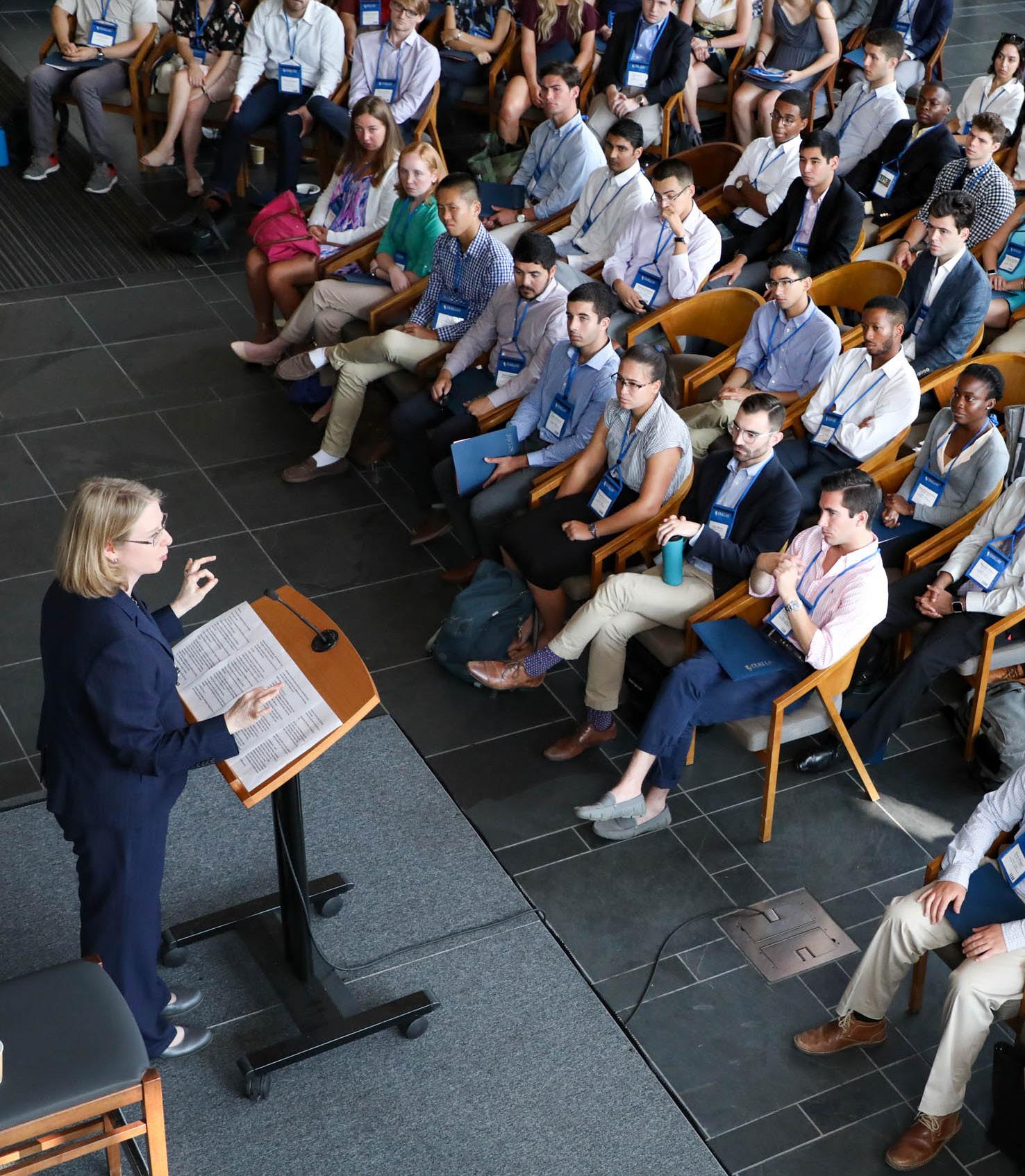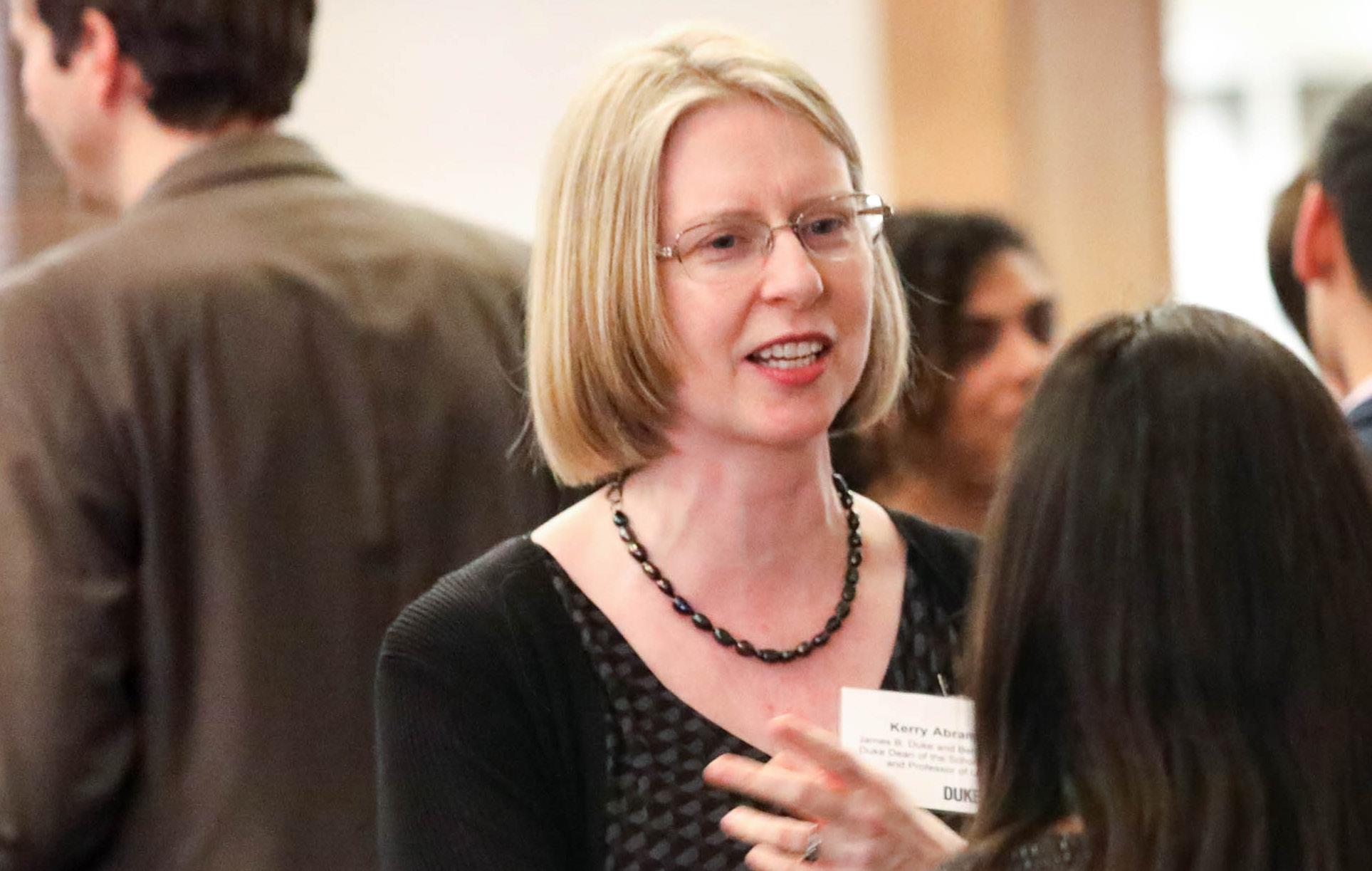Questions for the Dean
 Dean Kerry Abrams discusses the choices prospective LLM students face and some of the factors to consider when selecting a law school.
Dean Kerry Abrams discusses the choices prospective LLM students face and some of the factors to consider when selecting a law school.
Congratulations on your decision to embark on an LLM degree! This is an incredibly important time to be a lawyer. Many of the challenges our world faces, from climate change and pandemics to technological and political disruption, cry out for the problem-solving skills of lawyers. Law is critical to the functioning of democracy and the stability of the global economy.
Lawyers also do a breathtakingly broad range of work, from arguing complex cases and ensuring access to justice to negotiating corporate mergers and counseling start-up ventures. My own career as a lawyer has been more varied and interesting and fulfilling than I ever could have predicted.
I’ve litigated complicated commercial disputes on behalf of major corporations, served low-income tenants threatened with eviction, helped mentally disabled adults to get needed services, and filed amicus briefs before the U.S. Supreme Court advocating for the rights of immigrant families and LGBTQ couples. Supporting the ambitions of students at Duke Law School has been the most fulfilling role of all.
Applicants who are admitted to Duke are in the enviable position of selecting from many of the best law schools in the U.S. These schools will offer many similar features. So what questions should you be asking as you decide which school to attend? Here are the ones that I would focus on.
1Will I get to work closely with faculty?
All top law schools have faculty who are excellent scholars, but not all law school faculties are equally dedicated to their LLM students. When you consider a law school, ask the current students how accessible their professors are. Are they engaged and enthusiastic teachers? Do they meet with students outside the classroom? Do they provide career counseling and advice?
Every day, I am impressed by how seriously Duke Law faculty take their commitment to students. We have some of the most prominent legal minds in the world on our faculty, and they are very busy people. They are actively involved in impact litigation, advising government agencies, drafting legislation, and writing books and articles that advance their scholarly fields. But above all else, they are devoted to their students. Their deep and ongoing engagement with the subjects they teach and with the educational and professional development of their students creates an intellectual excitement that is palpable in our classrooms and hallways. This is the foundation for an atmosphere of mutual respect, collaboration, and communication across differences that defines our school culture and distinguishes Duke from many other top law schools.
2What opportunities does the school provide to help you develop as a professional?

An excellent legal education integrates the study of the law with professional skills training in an intellectually rigorous setting. This integration can happen in a variety of ways, but some signs that a school does it well include hands-on legal clinics, where you’ll represent real clients; experiential opportunities in the form of semester-long off- and on-campus externships; opportunities to study or work abroad; a rigorous legal analysis, writing, and research program; and courses that allow you to develop specific skills, such as negotiation or contract drafting or oral advocacy.
At Duke, we offer extensive professional skills training that is carefully integrated into our curriculum. One terrific example is our clinical program, in which students, working under the supervision of faculty, provide legal services to clients in areas such as entrepreneurship, environmental law and policy, international human rights, and wrongful convictions. This combination of academic inquiry and practice will equip you with the knowledge, judgment, and professional skills needed to be successful and continue to develop your career.
3How are alumni involved in the life of the school?

The moment you step onto your law school’s campus, you join a lifelong community and global network of legal professionals. Your law school’s alumni community is a tremendous resource — they will make up the professional network that helps you to launch your career. Take a look at the calendars of the schools you are considering. Do alumni come back to campus to speak to students? Does the school offer LLM networking opportunities that bring students and alumni together, both on campus and in cities like New York and Washington, D.C.? Do LLM alumni recruit at the school?
I have been amazed at the loyalty of Duke’s LLM and JD alumni body. Our graduates are spread throughout the world, yet they return to our campus regularly to give talks, teach courses, interview for their employers, participate in conferences, and serve in volunteer leadership roles. They also welcome our students and graduates into their cities and offices all over the world. One of the most enjoyable parts of my job as dean is travelling to meet our alumni. No matter where I go there are Duke Law alumni there to greet me, and they always want to know what they can do to advance our students’ careers.
What location will be most conducive to learning?
Location is critical, but perhaps not in the way you think. Many prospective students ask me whether they will be able to work in major financial and cultural centers in the U.S. and abroad if they choose to come to Duke. The answer is “of course.”
LLM graduates who remain in the U.S. often choose New York City, Washington D.C., and big cities in California, Texas, Georgia, or Florida to launch new careers, and our alumni base in those areas is large and strong. But many LLM graduates move on to cities around the world such as London, Paris, Hong Kong, and Brussels, while others return to their home country to resume working with their previous employer or join a new one, effectively leveraging their LLM degrees to enhance their legal careers.
Location is important not for where you’ll end up but because you’ll want to spend your time in law school learning as much as you can. The fundamental question to ask yourself is: Is this law school a place where I can enjoy being a student?
Look for a surrounding area that offers extracurricular opportunities that will help you achieve balance in your very busy life. Look for a school that is a part of a great university that can enhance your experience, both academic and cultural. If you come to campus, notice whether you can walk to other schools and events and engage with people in other disciplines.
I think that Duke is a marvelous place to attend law school. I love my life in Durham, a city that is big enough to be diverse and dynamic and yet is still affordable, with fantastic recreation and entertainment options and a farm-to-table restaurant scene that has gained national renown. Duke Law School is centrally located on Duke University’s campus, literally next-door to the Fuqua School of Business and the Sanford School
4
of Public Policy, and a 10-minute walk from almost everywhere else. You can enroll in classes at other schools in the university and participate in joint ventures that range from dual degree programs to leadership on interdisciplinary research teams. People come to Duke Law School, whether they are faculty or students, because they want to be part of a close-knit, supportive, and warm community. If that appeals to you, we might be the right choice for you.
In the end, choosing an LLM program is a personal decision that you should make only after a careful evaluation of the factors that are most important to you. Speak with LLM alumni of schools that you consider attending, including Duke’s. While I understand that international travel can be challenging, if you are able to visit a handful of programs, I strongly recommend that you do so. The International Studies staff will arrange for you to sit in on a class and meet a current LLM student during your visit. While you’re here, talk to people in the hallways, explore the campus, and soak up the atmosphere. Find the place that feels right to you — and then commit wholeheartedly to making the most of your LLM year. It will pass more quickly than you can imagine.
ABOUT DEAN KERRY ABRAMS
Kerry Abrams became the James B. Duke and Benjamin N. Duke Dean of the School of Law on July 1, 2018. Dean Abrams, who is also a Distinguished Professor of Law, is a scholar of immigration, citizenship, family, and constitutional law. Dean Abrams is wellknown for her scholarly writing on family-based migration, the legal regulation of immigrant families, and the history of immigration law. Prior to her appointment at Duke Law, Dean Abrams served on the law faculty of the University of Virginia for thirteen years, and, more recently, as vice provost for faculty affairs.
Dean Abrams is a graduate of Swarthmore College, where she earned a BA in English literature with highest honors. She graduated with distinction from Stanford Law School, where she was president of the Moot Court Board and the co-chair of Women of Stanford Law. After law school, she clerked for Judge Stanwood R. Duval Jr. of the U.S. District Court for the Eastern District of Louisiana and practiced as a commercial litigator for several years at the New York City law firm of Patterson, Belknap, Webb & Tyler LLP.

 Dean Kerry Abrams discusses the choices prospective LLM students face and some of the factors to consider when selecting a law school.
Dean Kerry Abrams discusses the choices prospective LLM students face and some of the factors to consider when selecting a law school.







